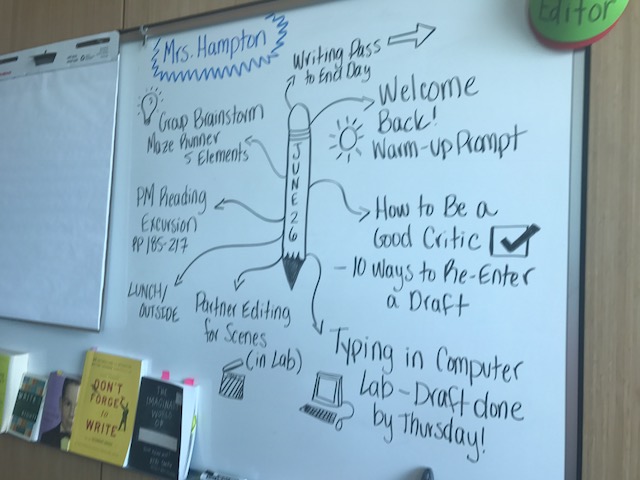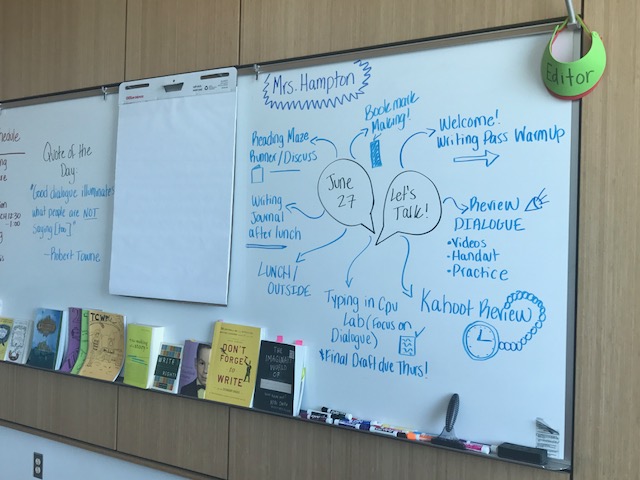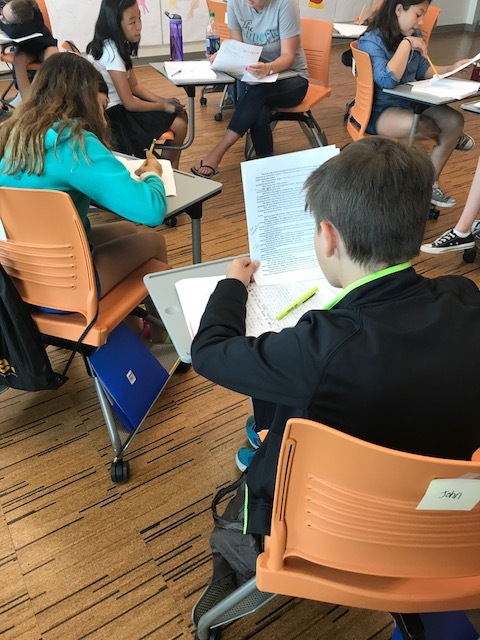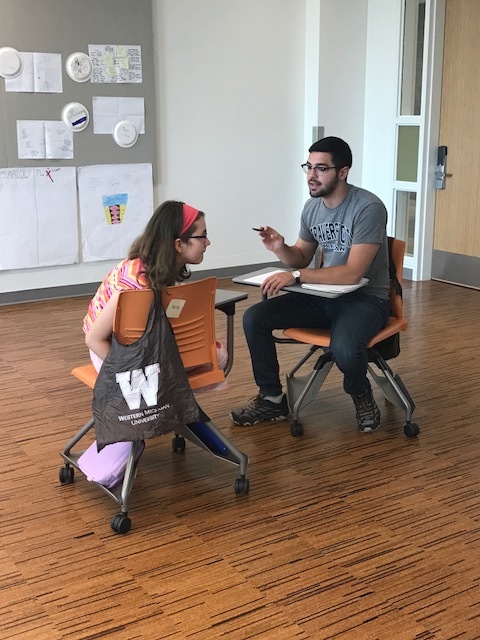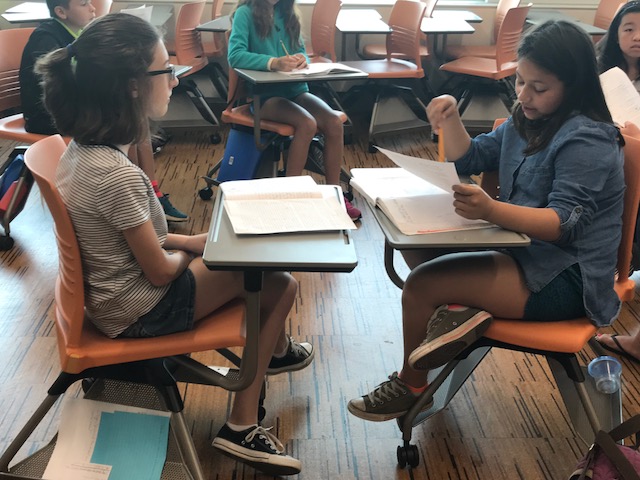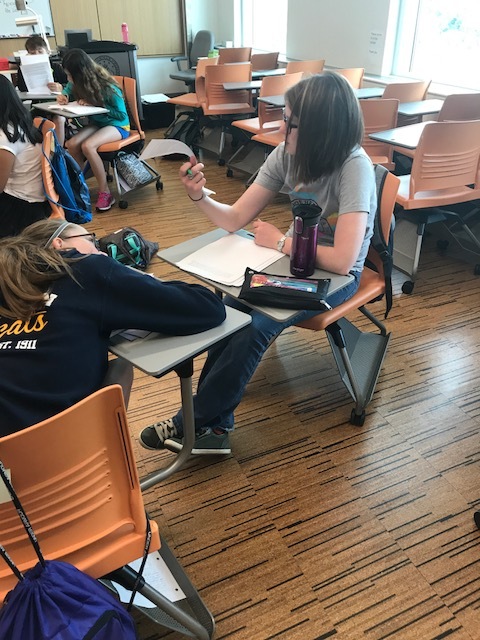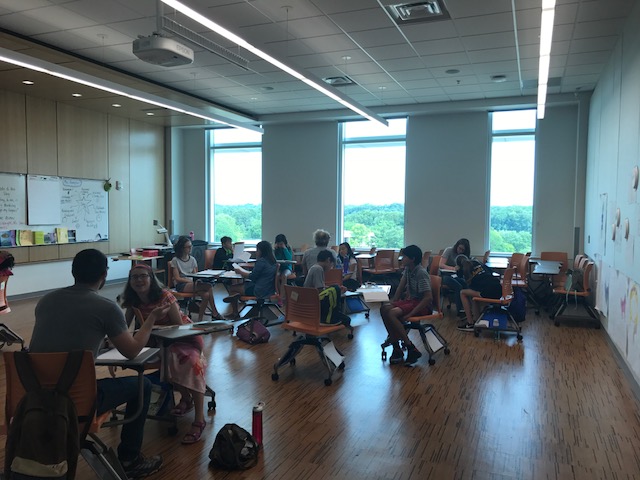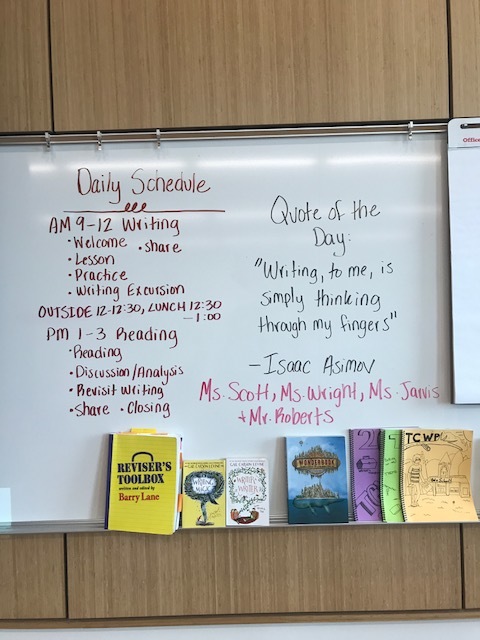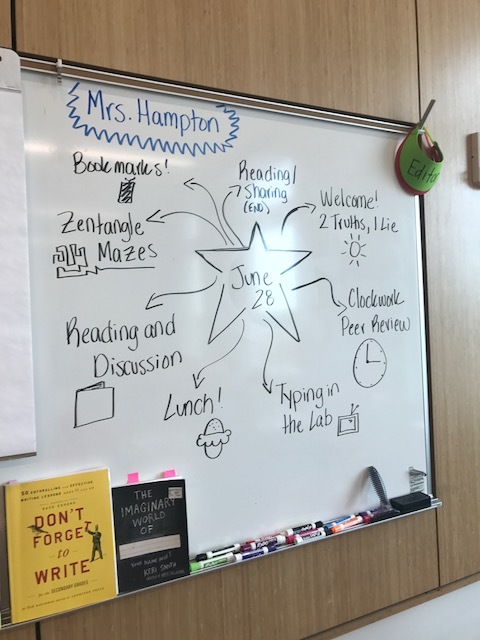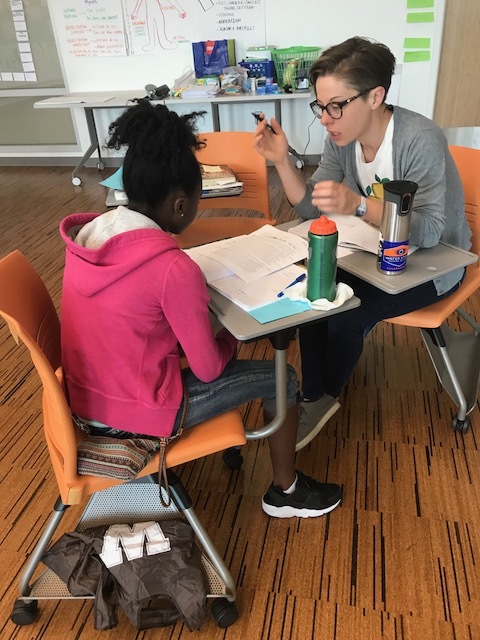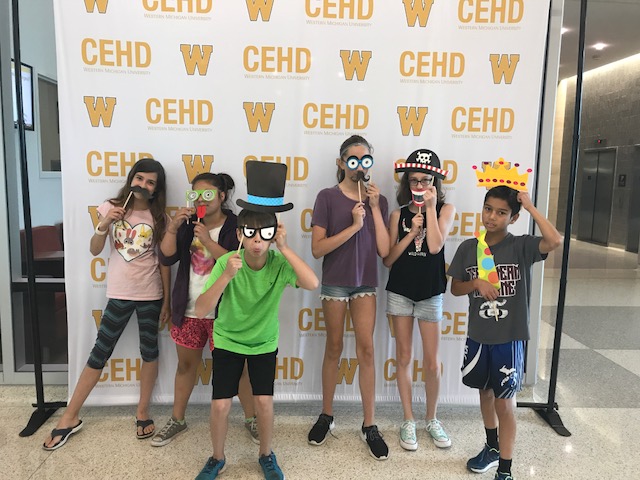Second Week of Creative Writing Camp in Review
Second Verse (Week 2)
Creative writing camp got done almost a week ago on June 30. If you remember my last post, Third Coast Writing Project and the McGinnis Reading Center teamed up to do something awesome this summer: reach out to kids to develop skills and have fun with reading AND writing at Western Michigan University. The second week was all about the revision of drafts of creative works of fiction. This post will include the goals for the week, show a sample daily breakdown, highlight some amazing pictures/moments, and show a key peer revision skill called clockwork editing.
Goals
The middle school group focused on WORLDBUILDING as the session was dubbed "Worldbuilding: Taking the Scenic Route." The goals for the week were:
1.) Take a rough draft and refine it into a final draft
2.) Work with others on peer editing
3.) Focus on skills needed to go back into a draft and reflect
Sample Daily Breakdown:
9:00-9:15// Writing Prompt Picture-Welcome back to Monday!
9:15-9:45// Revision Focus: Being a Good Critic (What is a Good Critic? Chart Observations)
10 Ways to Re-Enter a Draft-Handout from Barry Lane's book
9:45-10:45// Typing in Computer Lab
-Add World Descriptions/Titles/World Names
-Reminder to add Setting Snapshots (Make Worlds Come Alive)
10:45-11:00//Break
11:00-11:30// Partner Editing (Focus on List We Charted from Before)
-Review Parts of a Scene
SNAPSHOT + THOUGHTSHOT +DIALOGUE=SCENE
Pg. 109 in Barry Lane
-Find ONE partner to work with
11:30-11:45// Revision of Paper/Finishing Up with Draft (Final Edits Start Tomorrow-DRAFTS DUE BY THURSDAY)
11:45-12:00// Sharing of Writing for the Morning/Closure/Prep for Lunch
12:00-1:00// Lunchtime
1:00-1:45//Reading in Anchor Text with Focus on Strategy (READ IN BOOK: PP. 185-217)
PM Reading Excursion: Bernhard Global Lounge
-Reading Strategy: Review Dashner’s Plot, Character, Conflict, and Setting. How does he make this world come alive?
1:45-2:15//Reading Discussion/Analysis of Passages
-Small Groups Answer Questions on Paper (Chapters 1-33 on note cards-make a plot map on the doorway when we get back)
Group 1: Chapters 1-10
Group 2: Chapters 11-22
Group 3: Chapters 23-33
2:15-2:45//FUN WRITING ACTIVITY: WRITING PASS WITH CREATIVE WRITING STORIES
2:45-3:00//Sharing/Prepare to Leave/Closing Activity
Highlights of the Week
Creative writing camp got done almost a week ago on June 30. If you remember my last post, Third Coast Writing Project and the McGinnis Reading Center teamed up to do something awesome this summer: reach out to kids to develop skills and have fun with reading AND writing at Western Michigan University. The second week was all about the revision of drafts of creative works of fiction. This post will include the goals for the week, show a sample daily breakdown, highlight some amazing pictures/moments, and show a key peer revision skill called clockwork editing.
Goals
The middle school group focused on WORLDBUILDING as the session was dubbed "Worldbuilding: Taking the Scenic Route." The goals for the week were:
1.) Take a rough draft and refine it into a final draft
2.) Work with others on peer editing
3.) Focus on skills needed to go back into a draft and reflect
Sample Daily Breakdown:
9:00-9:15// Writing Prompt Picture-Welcome back to Monday!
9:15-9:45// Revision Focus: Being a Good Critic (What is a Good Critic? Chart Observations)
10 Ways to Re-Enter a Draft-Handout from Barry Lane's book
9:45-10:45// Typing in Computer Lab
-Add World Descriptions/Titles/World Names
-Reminder to add Setting Snapshots (Make Worlds Come Alive)
10:45-11:00//Break
11:00-11:30// Partner Editing (Focus on List We Charted from Before)
-Review Parts of a Scene
SNAPSHOT + THOUGHTSHOT +DIALOGUE=SCENE
Pg. 109 in Barry Lane
-Find ONE partner to work with
11:30-11:45// Revision of Paper/Finishing Up with Draft (Final Edits Start Tomorrow-DRAFTS DUE BY THURSDAY)
11:45-12:00// Sharing of Writing for the Morning/Closure/Prep for Lunch
12:00-1:00// Lunchtime
1:00-1:45//Reading in Anchor Text with Focus on Strategy (READ IN BOOK: PP. 185-217)
PM Reading Excursion: Bernhard Global Lounge
-Reading Strategy: Review Dashner’s Plot, Character, Conflict, and Setting. How does he make this world come alive?
1:45-2:15//Reading Discussion/Analysis of Passages
-Small Groups Answer Questions on Paper (Chapters 1-33 on note cards-make a plot map on the doorway when we get back)
Group 1: Chapters 1-10
Group 2: Chapters 11-22
Group 3: Chapters 23-33
2:15-2:45//FUN WRITING ACTIVITY: WRITING PASS WITH CREATIVE WRITING STORIES
2:45-3:00//Sharing/Prepare to Leave/Closing Activity
Highlights of the Week
Shoutout to the WMU students who also helped with peer review and editing!
Review of Revision Strategy: Clockwork Editing
Because this week focused on revision, I wanted to highlight one peer revision strategy I love to use to help students develop peer revision skills: clockwork editing.
Here is an awesome handout on Clockwork Buddies or Partners to get you started with me.
The first step is to have students make appointments with each other using a drawn clock and the appointment times of 12, 3, 6, and 9. Students sign up with each other and swap names. Making "appointments" sounds grown up and middle school students often strive for what makes them feel older at an in-between age. This exercise also urges them to make partners outside of their comfort zone because their friends may not always have their appointment time available. This helps build community. After everyone has an appointment, they return to their seats for directions.
For the first go at peer review, I like to give students a focus for peer revision while they meet with their partners. Some people like checklists, but I like to narrow it down further: one. thing. period.
For this exercise, each pair had a focus and was given the same directions.
1.) Read through the draft out loud.
2.) Give positive praise.
3.) Give suggestions based on the focus for the time spend with that partner.
As I announce each appointment time, student move to their appointments around the room. Questions to consider are posted on the board to help hesitant writers get a clear direction.
12 o'clock: Savvy Setting Snapshot Snoops
3 o'clock: Dialogue Detectives
6 o'clock: Thorough Thoughtshot Testers
9 o'clock: Careful Conflict Checkers
I love movement. I love helping kids move around the room during the lesson. Why? Because I love movement when I'm learning. I like to use this as a strategy to build students' toolboxes of writing skills. This helps them develop into better writers and also editors of other writing. I used the above as an example of a fiction strategy, but this also works nicely with non-fiction writing or academic works. For example, you could have one group checking for evidence, one group checking that topic sentences refer back to the claim, one group checking transitions, and one group checking verb tense. This cuts down on grading for the teacher and builds skills for the writer (woo hoo!)

